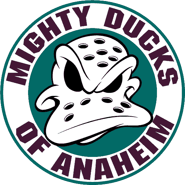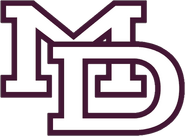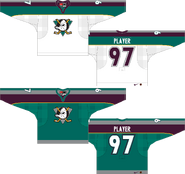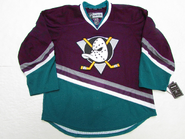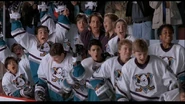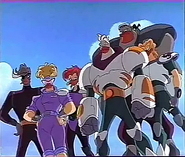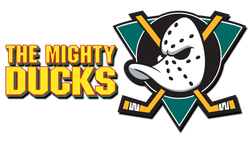(Created page with "thumb|250pxThe Anaheim Ducks are a professional ice hockey team based in Anaheim, California, USA. They are members of the Pacific Division o...") |
(→Series) |
||
| (37 intermediate revisions by 10 users not shown) | |||
| Line 1: | Line 1: | ||
| − | [[File: |
+ | [[File:Mighty_ducks_primary_logo.png|right|250px]]The '''[[Wikipedia:Anaheim Ducks|Anaheim Ducks]]''' are a professional ice hockey team based in [[Anaheim, California]], [[United States|USA]]. They are members of the Pacific Division of the Western Conference of the National Hockey League (NHL). Since their inception, the Ducks have played their home games at the Honda Center. |
| + | |||
| ⚫ | The club was founded in [[1993]] by [[The Walt Disney Company]] as the '''Mighty Ducks of Anaheim''', a name based on the [[1992]] film ''[[The Mighty Ducks]]''. Disney sold the franchise in [[2005]] to Henry and Susan Samueli, who changed the name of the team to the Anaheim Ducks before the [[2006]]–07 season. In their 18-year existence, the Ducks have made the playoffs eight times, winning three Pacific Division titles ([[2007]], [[2013]], and [[2014]]), two Western Conference Championships ([[2003]] and 2007), and one Stanley Cup Championship (2007). |
||
| ⚫ | |||
==History== |
==History== |
||
| + | [[File:Mighty_Ducks_script_logo.png|right|250px]] |
||
| − | <p style="margin-bottom: 0in">Mighty Ducks primary logo (1993–2006). The logo was subsequently used in the Disney movie [[D2: The Mighty Ducks]]. Disney design elements appear in this logo, such as team mascot Wildwing's goalie mask.</p> |
||
| ⚫ | The Mighty Ducks of Anaheim were founded in 1993 by The Walt Disney Company. The team's original name was chosen from the 1992 Disney movie [[The Mighty Ducks]], based on a group of misfit kids who turn their losing youth hockey team into a winning team. Disney subsequently made an animated series called [[Mighty Ducks (TV series)|Mighty Ducks]], featuring a fictional Mighty Ducks of Anaheim team that consisted of anthropomorphized ducks led by the Mighty Duck [[Wildwing Flashblade|Wildwing]] (itself the name of the real-life mascot of the Ducks). The Mighty Ducks logo was also featured in ''[[D2: The Mighty Ducks]]''. |
||
| + | |||
| ⚫ | The team was the first tenant of the Arrowhead Pond of Anaheim (now named the Honda Center), a brand-new arena in Anaheim located a short distance east of Disneyland and across the Orange Freeway from Angel Stadium. The arena was completed the same year the team was founded, with the naming rights originally being held by Arrowhead Water. |
||
| + | |||
| ⚫ | The Ducks selected Ron Wilson to be the first coach in team history. The Ducks selected Paul Kariya fourth overall in the 1993 NHL Entry Draft. He would turn out to be the face of the franchise for many years. The team selected Steve Rucchin second overall in the 1994 Supplemental Draft. In the middle of their third year, on February 7, 1996, the team made a blockbuster deal with the Winnipeg Jets. The Ducks sent Chad Kilger, Oleg Tverdovsky, and a third-round pick to the Jets in return for Marc Chouinard, a fourth-round draft pick, and right winger Teemu Selanne. These three players became one of most potent lines of their time. The franchise's first game was played at home on October 8, 1993, versus the Detroit Red Wings. The Ducks lost 7–2. Two games later, on October 13, 1993, also on home ice, the Ducks won the first game in franchise history 4–3 versus the Edmonton Oilers. The Ducks had their first shut out in team history on December 15, 1993, 1–0 versus the Toronto Maple Leafs. |
||
| + | |||
| ⚫ | The Ducks reached the post-season for the first time during the 1996–97 NHL season. The Ducks finished with a 36–33–13 record, the franchise's first winning record, good enough for home ice in the first round as the number four seed against the Phoenix Coyotes. The Ducks trailed 3–2 going into Phoenix for game six. Kariya scored in overtime to force the franchises first game 7 which they won. In the second round, however, they lost to the eventual Stanley Cup champion Red Wings in a four game sweep. After the season, Wilson was fired after saying he would like to coach the Red Wings. The Ducks missed the playoffs in 1998 with Pierre Page at the helm. The Ducks followed that season up by finishing 6th in the Western Conference in 1998–99 NHL season with new head coach Craig Hartsburg. However, they were swept by the Red Wings again, this time in the first round. |
||
| + | |||
| ⚫ | In the 1999–2000 NHL season, the Ducks finished with a winning record, but missed the playoffs by 4 points as the rival San Jose Sharks took 8th place that year with 87 points while the Mighty Ducks took 9th place with 83 points. In the 2000–01 NHL season, the Ducks ended up doing even worse as Kariya and Selanne substantially dropped points production from the previous season. Kariya went from 86 points to 67 points and Selanne went from 85 points to 57 points. Selanne was dealt to San Jose at the trade deadline for Jeff Friesen, Steve Shields, and a second round draft pick and Hartsburg was fired during the season. The team ended up with a losing record and last place in the Western Conference that season. Without Selanne, Kariya's numbers continued to drop in the 2001–02 NHL season with new coach Bryan Murray. The Mighty Ducks finished in 13th place in the Western Conference. |
||
| + | |||
| ⚫ | The Mighty Ducks did not reach the postseason again until the 2002–03 NHL season with coach Mike Babcock. They entered the playoffs in 7th place with a 40–27–9–6 record, good enough for 95 points. In the first round, the Ducks were once again matched up with the Red Wings, the defending Stanley Cup Champions. They shocked the hockey world by sweeping the Red Wings in four games. Rucchin scored the series winning goal in overtime in game four. In the second round, the Ducks faced the Dallas Stars. Game one turned out to be the fourth longest game in NHL history with Petr Sykora scoring in the fifth overtime to give the Mighty Ducks the series lead. The Ducks would finish off the Stars in game six at home. In the team's first trip to the Western Conference Finals, they were matched up against another Cinderella team, the sixth seeded Minnesota Wild. Jean-Sebastien Giguere strung together three consecutive shutouts and allowed only one total goal in the series in an eventual sweep. |
||
| ⚫ | The 2003 Stanley Cup Finals had some interesting story lines. Anaheim forward Rob Niedermayer was playing against his brother, defenseman for the New Jersey Devils, Scott Niedermayer and Giguere faced off against fellow French Canadian goalie Martin Brodeur. The series began with the home team winning the first five games. In game six at home, Kariya was knocked out by Devils defenseman Scott Stevens. Kariya would return in the second period and score the fourth goal of the game. In an exciting third period, the Mighty Ducks defeated the Devils 5–2 to send the series back to New Jersey for game seven. Anaheim could not complete their Cinderella run, though, as they lost a hard-fought game 7 to the Devils 3–0. For his brilliant play during the post-season, Giguere won the Conn Smythe Trophy as Most Valuable Player of the playoffs. He became only the fifth player in NHL history to have won the trophy as a member of the losing team. Giguere posted a 15–6 record, 7–0 in overtime, with a 1.62 GAA, a .945 sv. pct. and a record 168 minute, 27 second shutout streak in overtime. |
||
| ⚫ | |||
| ⚫ | After the season, Kariya promised to bring the Mighty Ducks back to the Stanley Cup Final the following year. Kariya, however, left the Ducks in the summer and joined Selanne on the Colorado Avalanche. The 2003–04 NHL season was a season to forget as Giguere could not repeat his amazing play from the previous year. The team finished in 12th place in the standings with a 29–35–10–8 record. Giguere's stats subsequently went down from the previous season as he only won half the games he did the year before, his goals against average went up from 2.30 to 2.62, his save percentage went down from .914 to .907, and he went from 8 shutouts to just three. The team also went from 203 goals to 174. |
||
| ⚫ | |||
| + | In 2013, the Ducks celebrated their 20th year as an NHL franchise. To commemorate the anniversary, the team held a throwback night on October 13. They played a regular season game against the Ottawa Senators and won 4-1. They wore purple throwback uniforms based off that of the original Mighty Ducks team. In addition, the presentation for the game was in the style of the 90s, featuring 90s music, and even the team's opening intro video that was played on the video board during the 1998/99 season. Members of the original 1993 team attended the game. |
||
| ⚫ | |||
| + | ==Gallery== |
||
| ⚫ | |||
| + | ===Logos=== |
||
| + | <gallery position="center" bordersize="none" captionalign="center" bordercolor="transparent"> |
||
| + | Mighty Ducks alternate logo.png|The Mighty Ducks alternate logo, featuring the team name and Wild Wing's mask. This logo was a shoulder patch on the primary jerseys from 1996-2006. |
||
| + | Mighty Ducks 2003 logo.png|The logo used on the 2003-2006 alternate jersey. |
||
| + | Mighty Ducks 2003 alternate logo.png|The logo that appeared on the shoulders of the 2003-2006 alternate jersey. |
||
| + | </gallery> |
||
| ⚫ | |||
| + | ===Uniforms=== |
||
| ⚫ | |||
| + | <gallery position="center" orientation="none" spacing="medium" columns="dynamic" bordercolor="#441735" captionposition="below" bordersize="none" captionalign="center"> |
||
| + | Mighty Ducks 1993 original jerseys.png|The original Mighty Ducks team uniforms, used from 1993-2006. The white jersey (sans the shoulder logo patches) was used in ''[[D2: The Mighty Ducks|D2]]'' and ''[[D3: The Mighty Ducks|D3]]''. The shoulder logo patch was added in the 1996/97 NHL season. |
||
| + | p9f7x6g3amgmu0c6fhp1.png|The short-lived original alternate jersey, introduced in the 1995/96 season as a part of the NHL's third jersey program. It features the team's mascot, Wild Wing, and the primary logo on the shoulders. It unsurprisingly didn't receive much acclaim, and was retired after a few games. |
||
| + | Mighty Ducks alternate jerseys 1997.png|The two alternate jerseys worn starting in the 1997/98 season. The teal jersey only lasted two seasons, whereas the white one lasted three. |
||
| + | Mighty Ducks alternate jersey 2003.png|The alternate jersey introduced in 2003 and worn until the last Mighty Ducks season. The jersey is completely void of the original Mighty Ducks identity. |
||
| + | Mighty Ducks 2013 throwback jersey.png|The original 1993 purple jersey in the modern Reebok NHL jersey template- the jersey that was used for the game on Throwback Night on October 13, 2013. |
||
| + | D2-the-mighty-ducks-the-mighty-duck-movies-12301301-853-4801.jpg|The original white jersey as it appeared in ''D2''. |
||
| + | </gallery> |
||
| + | ==Series== |
||
| ⚫ | |||
| + | <gallery position="center" captionalign="center"> |
||
| + | vidshot-2016-09-04-10h26m49s126.png|The animated duck version of the team in ''[[Mighty Ducks (TV series)|The Mighty Ducks Animated Series]]''. |
||
| + | </gallery> |
||
| + | {{Wikipedia|Anaheim Ducks}} |
||
| ⚫ | |||
| + | {{The Mighty Ducks}} |
||
| + | [[Category:Sports teams]] |
||
| + | [[Category:The Mighty Ducks]] |
||
| + | [[Category:Ex-Disney franchises]] |
||
Revision as of 20:24, 4 August 2019
The Anaheim Ducks are a professional ice hockey team based in Anaheim, California, USA. They are members of the Pacific Division of the Western Conference of the National Hockey League (NHL). Since their inception, the Ducks have played their home games at the Honda Center.
The club was founded in 1993 by The Walt Disney Company as the Mighty Ducks of Anaheim, a name based on the 1992 film The Mighty Ducks. Disney sold the franchise in 2005 to Henry and Susan Samueli, who changed the name of the team to the Anaheim Ducks before the 2006–07 season. In their 18-year existence, the Ducks have made the playoffs eight times, winning three Pacific Division titles (2007, 2013, and 2014), two Western Conference Championships (2003 and 2007), and one Stanley Cup Championship (2007).
History
The Mighty Ducks of Anaheim were founded in 1993 by The Walt Disney Company. The team's original name was chosen from the 1992 Disney movie The Mighty Ducks, based on a group of misfit kids who turn their losing youth hockey team into a winning team. Disney subsequently made an animated series called Mighty Ducks, featuring a fictional Mighty Ducks of Anaheim team that consisted of anthropomorphized ducks led by the Mighty Duck Wildwing (itself the name of the real-life mascot of the Ducks). The Mighty Ducks logo was also featured in D2: The Mighty Ducks.
The team was the first tenant of the Arrowhead Pond of Anaheim (now named the Honda Center), a brand-new arena in Anaheim located a short distance east of Disneyland and across the Orange Freeway from Angel Stadium. The arena was completed the same year the team was founded, with the naming rights originally being held by Arrowhead Water.
The Ducks selected Ron Wilson to be the first coach in team history. The Ducks selected Paul Kariya fourth overall in the 1993 NHL Entry Draft. He would turn out to be the face of the franchise for many years. The team selected Steve Rucchin second overall in the 1994 Supplemental Draft. In the middle of their third year, on February 7, 1996, the team made a blockbuster deal with the Winnipeg Jets. The Ducks sent Chad Kilger, Oleg Tverdovsky, and a third-round pick to the Jets in return for Marc Chouinard, a fourth-round draft pick, and right winger Teemu Selanne. These three players became one of most potent lines of their time. The franchise's first game was played at home on October 8, 1993, versus the Detroit Red Wings. The Ducks lost 7–2. Two games later, on October 13, 1993, also on home ice, the Ducks won the first game in franchise history 4–3 versus the Edmonton Oilers. The Ducks had their first shut out in team history on December 15, 1993, 1–0 versus the Toronto Maple Leafs.
The Ducks reached the post-season for the first time during the 1996–97 NHL season. The Ducks finished with a 36–33–13 record, the franchise's first winning record, good enough for home ice in the first round as the number four seed against the Phoenix Coyotes. The Ducks trailed 3–2 going into Phoenix for game six. Kariya scored in overtime to force the franchises first game 7 which they won. In the second round, however, they lost to the eventual Stanley Cup champion Red Wings in a four game sweep. After the season, Wilson was fired after saying he would like to coach the Red Wings. The Ducks missed the playoffs in 1998 with Pierre Page at the helm. The Ducks followed that season up by finishing 6th in the Western Conference in 1998–99 NHL season with new head coach Craig Hartsburg. However, they were swept by the Red Wings again, this time in the first round.
In the 1999–2000 NHL season, the Ducks finished with a winning record, but missed the playoffs by 4 points as the rival San Jose Sharks took 8th place that year with 87 points while the Mighty Ducks took 9th place with 83 points. In the 2000–01 NHL season, the Ducks ended up doing even worse as Kariya and Selanne substantially dropped points production from the previous season. Kariya went from 86 points to 67 points and Selanne went from 85 points to 57 points. Selanne was dealt to San Jose at the trade deadline for Jeff Friesen, Steve Shields, and a second round draft pick and Hartsburg was fired during the season. The team ended up with a losing record and last place in the Western Conference that season. Without Selanne, Kariya's numbers continued to drop in the 2001–02 NHL season with new coach Bryan Murray. The Mighty Ducks finished in 13th place in the Western Conference.
The Mighty Ducks did not reach the postseason again until the 2002–03 NHL season with coach Mike Babcock. They entered the playoffs in 7th place with a 40–27–9–6 record, good enough for 95 points. In the first round, the Ducks were once again matched up with the Red Wings, the defending Stanley Cup Champions. They shocked the hockey world by sweeping the Red Wings in four games. Rucchin scored the series winning goal in overtime in game four. In the second round, the Ducks faced the Dallas Stars. Game one turned out to be the fourth longest game in NHL history with Petr Sykora scoring in the fifth overtime to give the Mighty Ducks the series lead. The Ducks would finish off the Stars in game six at home. In the team's first trip to the Western Conference Finals, they were matched up against another Cinderella team, the sixth seeded Minnesota Wild. Jean-Sebastien Giguere strung together three consecutive shutouts and allowed only one total goal in the series in an eventual sweep.
The 2003 Stanley Cup Finals had some interesting story lines. Anaheim forward Rob Niedermayer was playing against his brother, defenseman for the New Jersey Devils, Scott Niedermayer and Giguere faced off against fellow French Canadian goalie Martin Brodeur. The series began with the home team winning the first five games. In game six at home, Kariya was knocked out by Devils defenseman Scott Stevens. Kariya would return in the second period and score the fourth goal of the game. In an exciting third period, the Mighty Ducks defeated the Devils 5–2 to send the series back to New Jersey for game seven. Anaheim could not complete their Cinderella run, though, as they lost a hard-fought game 7 to the Devils 3–0. For his brilliant play during the post-season, Giguere won the Conn Smythe Trophy as Most Valuable Player of the playoffs. He became only the fifth player in NHL history to have won the trophy as a member of the losing team. Giguere posted a 15–6 record, 7–0 in overtime, with a 1.62 GAA, a .945 sv. pct. and a record 168 minute, 27 second shutout streak in overtime.
After the season, Kariya promised to bring the Mighty Ducks back to the Stanley Cup Final the following year. Kariya, however, left the Ducks in the summer and joined Selanne on the Colorado Avalanche. The 2003–04 NHL season was a season to forget as Giguere could not repeat his amazing play from the previous year. The team finished in 12th place in the standings with a 29–35–10–8 record. Giguere's stats subsequently went down from the previous season as he only won half the games he did the year before, his goals against average went up from 2.30 to 2.62, his save percentage went down from .914 to .907, and he went from 8 shutouts to just three. The team also went from 203 goals to 174.
In 2013, the Ducks celebrated their 20th year as an NHL franchise. To commemorate the anniversary, the team held a throwback night on October 13. They played a regular season game against the Ottawa Senators and won 4-1. They wore purple throwback uniforms based off that of the original Mighty Ducks team. In addition, the presentation for the game was in the style of the 90s, featuring 90s music, and even the team's opening intro video that was played on the video board during the 1998/99 season. Members of the original 1993 team attended the game.
Gallery
Logos
Uniforms
Series
| This page uses content from the English Wikipedia page Anaheim Ducks. The list of authors can be seen in the page history. Text from Wikipedia is available under the Creative Commons Attribution-ShareAlike License; additional terms may apply. |



